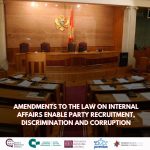4/6/2015 – HRA AGAINST SPEECH INCITING TO VIOLENCE AGAINST THE MEDIA
04/06/201508/06/2015 – HRA AND CCE WROTE TO THE SUPREME STATE PROSECUTOR REGARDING THE CANDIDATE FOR THE CHIEF SPECIAL PROSECUTOR
09/06/20157/6/2015 – HRA AND JUVENTAS PROPOSED TO MPs AMENDMENTS TO THE DRAFT LAW ON THE EXECUTION OF PRISON SENTENCES, FINES AND SECURITY MEASURES
Human Rights Action (HRA) and Juventas submitted to the Committee on Political System, Justice and Administration proposals for 20 amendments to the Draft Law on the Execution of Prison Sentences, Fines and Security Measures. The Committee session was held today. The Minister of Justice himself today did not support them, claiming also that EU TAIEX expert provided a ”green light” for the law so there is no need for further amendments. The willingness of the MPs themselves to support the amendments remains to be seen at the next session.
All proposed amendments contribute to protecting and exercising human rights of persons serving a prison sentence or those who are in detention, and the most important ones are based on explicit recommendations of the European Committee for the Prevention of Torture and Inhuman or Degrading Treatment or Punishment (CPT) to Montenegro issued after their visit in 2008 and 2013.
Bearing in mind these recommendations and the fact that usage of coercive measures in prison carries the greatest risk of violating the absolutely protected human right to protection from torture and other ill-treatment, we requested that the Institution for Execution of Criminal Sanctions (prison) is obliged to report the use of force against prisoners to the Ministry of Justice, the Supreme Prosecutor’s Office and Protector of Human Rights and Freedoms, rather than, as currently provided, that it is left to the discretion of the Head of prison to assess whether the force applied had been excessive and to then in accordance with this assessment inform the Ministry. Also, we proposed that a medical report, following the coercion, should contain a statement of the prisoners on how s/he was injured, as well as medical opinion on the connection between the applied coercive measures and the resulting injuries. The results of inspection must be available to the prisoner who must be allowed examination by a court medical expert. The proposed method contributes to a delayed decision on justification and legality of the coercive measures.
With this regard, we proposed ensuring independence of medical staff working in the Institute for Execution of Criminal Sanctions by providing that they are employees of the Ministry of Health, not the Institute for Execution of Criminal Sanctions, as proposed. We proposed explicitly that it is forbidden and punishable to punish prisoners by using force, i.e. to continue with the application of force against prisoners even when their resistance is suppressed.
Finally, we proposed returning the provision according to which the Ministry’s consent will be required for isolation lasting longer than three months a year, the obligation of the Head of prison to periodically review the decision on continuation of the isolation and transfer, as well as that the prisoner is handed a written notice of rights and obligations while serving a sentence immediately upon receipt to the Institute for Execution of Criminal Sanctions.
During the public hearing HRA has, in its capacity as a member of the Working Group for drafting the Law, achieved that the majority of the proposed provisions are found in the text of the draft. Unfortunately, the draft later underwent changes at the expense of the safeguards against ill-treatment of people who are in prison i.e. detention, so we are attempting to correct this omission in parliamentary procedure.
HRA team
The proposed amendments (in Montenegrin) are available here.







 English
English